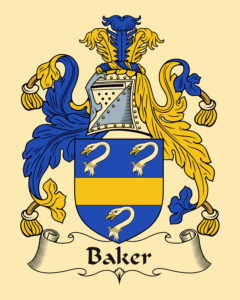
We sell our products exclusively on Amazon so you can buy with confidence knowing you are protected by Amazons no hassle return policy and our 4.9 star lifetime seller rating with over 2000 reviews. Items featuring a family crest make great gifts, whether for yourself or that hard to buy for family member, friend or co-worker.
We sell Mugs, Plaques, Prints, Ceramic Tiles, Coasters, Garden Flags, License Plates and Mouse Pads featuring The Baker Coat of Arms. Click the image to go to Anglo/Irish names A section of our Amazon store.
We also sell customized license plates (add your own image and text). customizable mugs and license plates for military veterans, classic art on mouse pads and posters, a wide variety of flag license plates for nations around the world as well as pride flags and Native American tribal flags. Click here to go to our Amazon Store front.
Etymology
The surname Baker is an occupational name deriving from the Old English word “bæcere” or “bæcestre,” which means “baker” or “one who bakes.” This occupational surname was commonly adopted in medieval England, where bread was a staple food, and the role of the baker was a critical one in every community.
Earliest Recorded Use
England
The surname Baker has deep roots in England, with records dating back to the 12th century. The name appears in the Domesday Book of 1086 as a personal name. The earliest recorded use of Baker as a surname is found in the Curia Regis Rolls of 1199, where a “William le Bakere” is mentioned. By the 13th century, it was a widespread surname across England. Occupational surnames were among the first to become hereditary, and Baker is an example of this trend.
Scotland
In Scotland, the surname Baker also appears in the 12th and 13th centuries, albeit less frequently than in England. The Scottish variation of the name sometimes appears as “Baxter,” derived from the Old English “bæcestre,” which specifically referred to a female baker. The Baxter form became more common in Scotland and parts of Northern England, showing the regional linguistic variations in surname development.
Ireland
In Ireland, the surname Baker is found mainly among the Anglo-Irish population, the descendants of English settlers who came to Ireland during the Norman invasion and subsequent plantations. The earliest record of the surname in Ireland dates to the 14th century. One of the notable early records is that of John Baker, who was granted lands in Ireland in 1310. The surname did not originate from the native Gaelic tradition but was brought over by English and Scottish settlers.
United States
The surname Baker was among the many brought to America by English settlers during the early years of colonization. One of the earliest recorded Bakers in America was Thomas Baker, who arrived in Massachusetts Bay Colony in 1635 aboard the ship “Elizabeth and Ann.” The Bakers became well-established in various colonies, and the name is still widespread in the United States today.
Spelling Variations
As with many surnames, the spelling of Baker has varied over the centuries and across different regions. Some of these variations include: Bakere, Bakker, Baxtere, Backer, Beckar, Beaker, Baeker, Bakur
The variation “Baxter” is particularly noteworthy in Scotland and Northern England, where the Old English influence was strong. Regional dialects and the phonetic spelling conventions of the time led to these different forms.
Conclusion
The surname Baker is a classic example of an occupational surname that has deep historical roots and has spread widely due to migration and colonization. Originating from the Old English word for a baker, it was first recorded in England in the late 12th century and has since appeared in Scotland, Ireland, and the United States. The various spellings of Baker reflect regional linguistic influences and the evolution of the English language over time. Today, Baker remains a common surname, carrying with it a history that spans nearly a millennium.